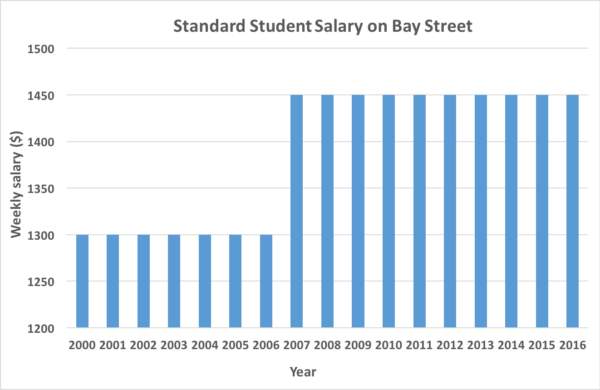
Want to hear a surprising fact? Law students working at Toronto’s largest firms haven’t gotten a raise in 10 years.
The last time students on Bay Street — both summer and articling — received a wage hike was in 2007. In that year, Cassels Brock & Blackwell LLP bumped the salaries for their student cohorts from $1,300 a week to $1,450. Out of competitive pressure, 13 out of the 15 other large firms quickly followed suit.

The two firms that didn’t raise their salaries were Bennett Jones LLP and Davies Ward Phillips & Vineberg LLP. For its part, Bennett Jones has paid its students $1,700 a week since the early 2000s, when the Calgary-headquartered firm first broke into Toronto. It was their effort to attract top students who might not know about the firm. Meanwhile, Davies bumped its student salary from $1,450 to $1,600 in 2005, and hasn’t changed it since.
Back in 2007, Cassels had raised its student salaries to compete with firms from New York City, who had a habit of poaching the crème de la crème Canadian students.
“We used to raise salaries when summer student recruitment was very competitive,” says Deborah Glatter, director of practice excellence at Cassels. “Now, students count themselves lucky to get one or two offers.”
Why is that the case? Well, for one, the financial crisis of 2008. After it rocked the business world, top firms in New York City stopped recruiting as heavily in Canada.
And meanwhile, there is now an oversupply of law grads in the Canadian market. The number of law students has risen, but the number of summer jobs on Bay Street has dropped. In 2008, the largest 16 firms in Toronto hired 323 second-year summer students. But for the upcoming summer, they’ve hired 257, a 20 percent drop. “Firms aren’t pressured to increase student salaries to attract the really good candidates,” says Darcy Legros, national director of professional development at Bennett Jones LLP.
So what would it take for another raise to occur on Bay Street? Legros says an uptick in the legal market could spur another pay hike. Or, if one firm raised its salaries, the rest might feel obligated to do the same. But overall, no firm will start paying students more if it still feels it’s attracting the best candidates. “Our key driver would be whether our recruitment efforts are being impacted,” says Legros. And so far, firms have the pick of the litter.
More about Bay Street & Summer Jobs:
- What a career on Bay Street is really like
- Top female associates dish on life in big law
- How working as a research assistant landed one student a government articling job
- How one student landed a summer job after coming up short in the OCI process
- 6 things to remember if you didn’t get a big-firm summer job
